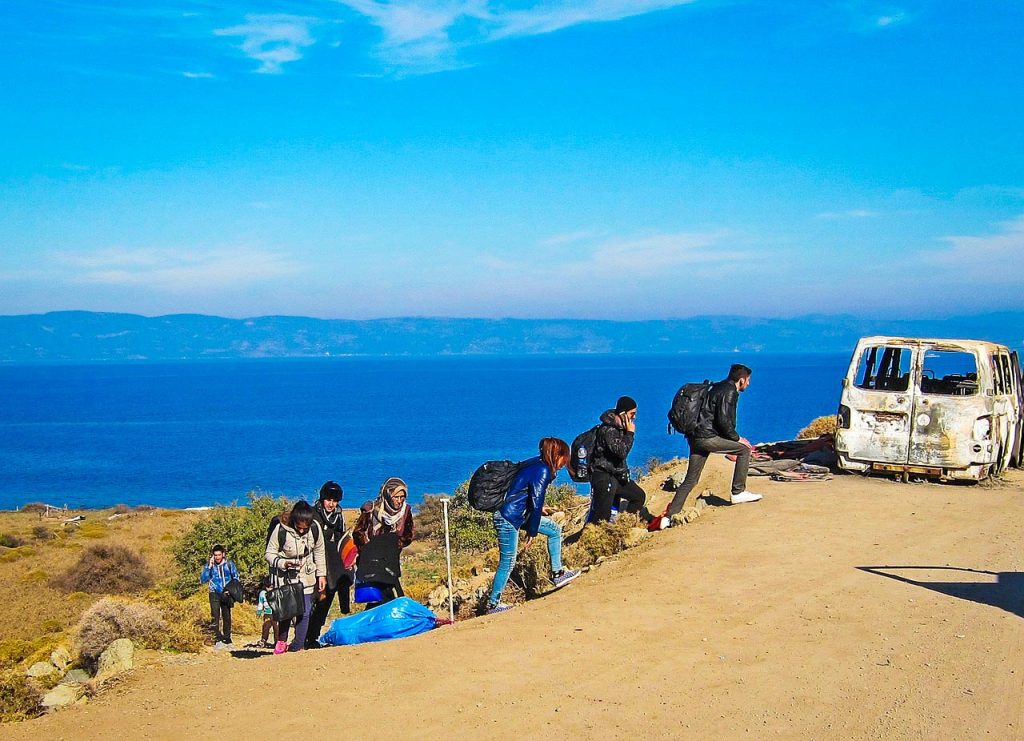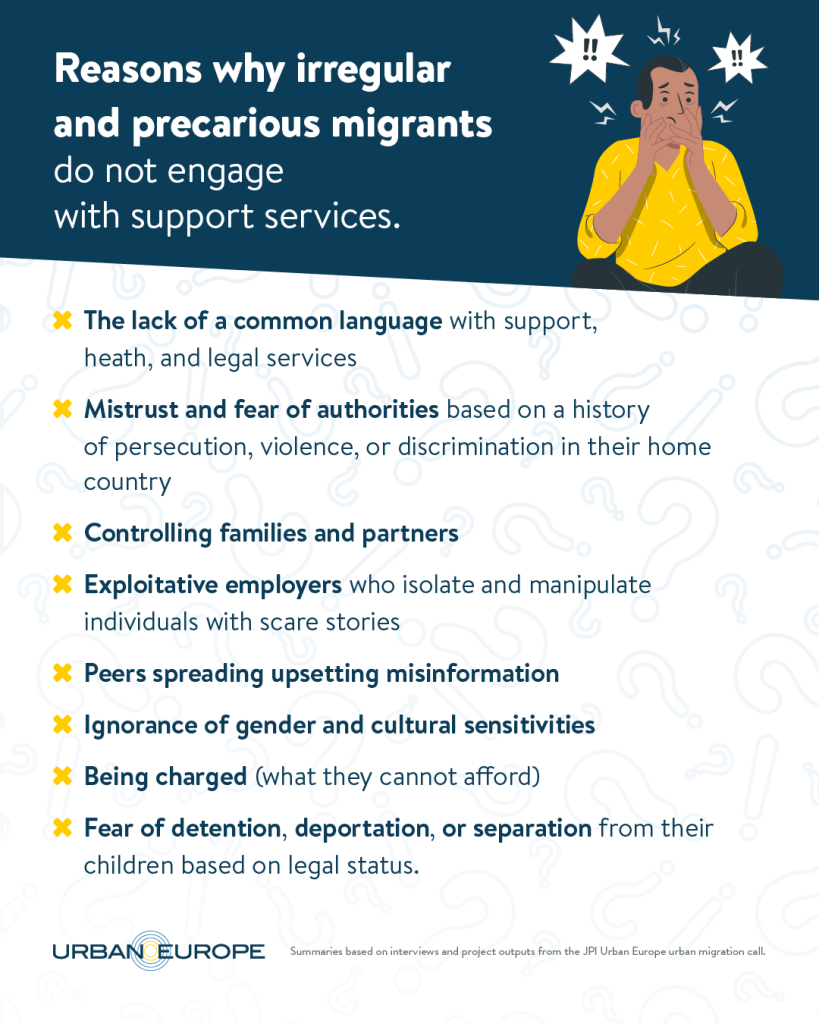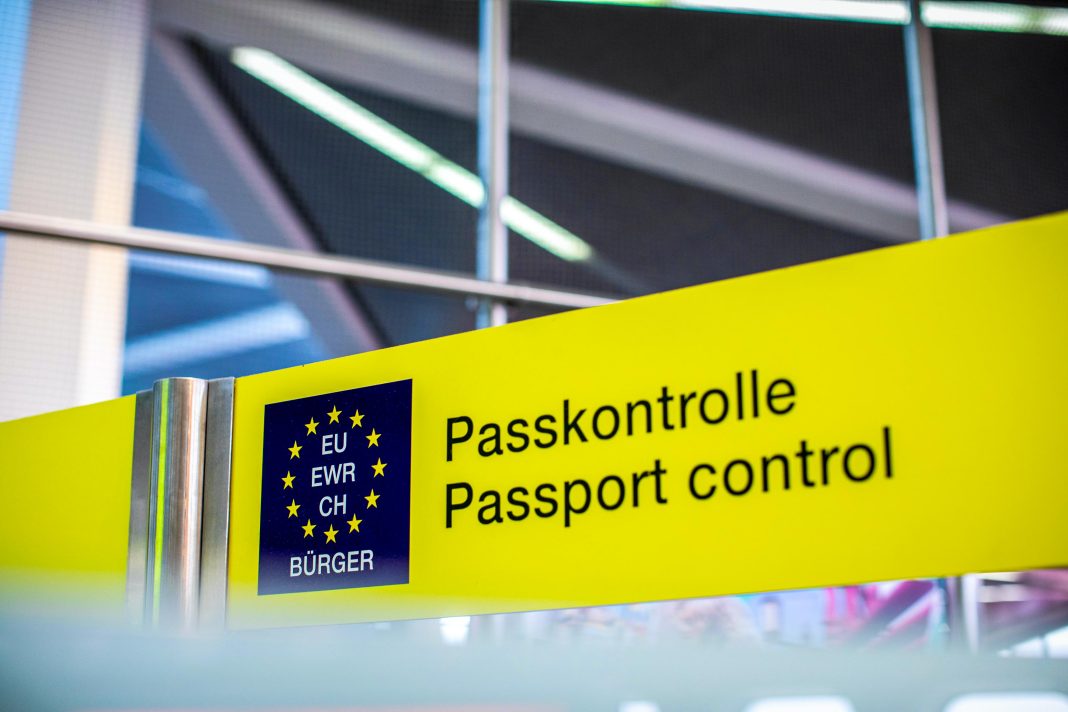Migration is a complex and divisive topic. Multiple political, economic, social, even environmental factors contribute to the discourse – not to mention a minefield of misinformation. For better or worse, these influences affect migrants’ experiences and impact integration, as well as influence cities’ approaches to newcomers. To find out exactly what this means for urban places and the way they function, JPI Urban Europe established a call for research into urban migration. The eight projects involved provide an extensive and current knowledge base that offers us greater understanding of the main and nuanced challenges of urban migration. We bring these findings together to serve as a basis for authorities to recognise the situation in their own city and to begin to formulate the solutions.
The State(s) We’re In
There has always been a movement of people across countries, and our reasons today are much the same as they ever were: to be where food, family, money, and safety are found, or to escape persecution, natural disasters, and environmental degradation.
Then came the so-called ‘summer of migration’. For many Europeans, this brought mass migration to their attention. It was labelled a ‘crisis’ because one million displaced people arrived on our doorsteps after travelling long, perilous journeys. In reality, this is a drop in the ocean.
In the first few months of 2022, 100 million people globally were forced to flee, leaving behind everything they know. A contributing factor was instability and violence in countries that included Ethiopia, Myanmar, Nigeria, and Afghanistan. But in a classic case of NIMBY-ism, it’s only those who arrive at our borders that Europeans are really bothered by. In 2015 that was mainly those fleeing Syria and Afghanistan. Then in 2022, Russia’s invasion of Ukraine uprooted a further eight million, many of whom spread westwards.
But wait, there’s more! Climate change is causing increasingly extreme weather conditions. Floods, fires, rising sea levels, and dangerous levels of heat are all becoming common contributors to the causes of mass human movement.
So, like it or not, migration is not going to stop and most arrivals tend to end up in cities, where the bulk of arrival infrastructures are located.
Urban communities have little choice but accept that newcomers will continue to join them. What we can and must decide, however, is whether we adopt a stance of hostility or learn how to deal with the challenges immigration presents.
The Arrival Experience
What awaits migrants when they turn up in a European city? Possibly a friendly welcome, but almost definitely – according to research – an intersecting nexus of deep-rooted social and institutional barriers that hinder their chances of settling.
Due to their vulnerability, those with a precarious, irregular, or undocumented status are the worst affected.
Many European countries expect migrants to integrate. At the same time, national policies and divisive rhetoric seek to deter new arrivals by creating a hostile environment. This demonises foreign nationals to curry favour with voters who subscribe to unprogressive views and prejudices.
This hostility materialises as exclusion, cutting migrants off from the basic rights and services the rest of us are privy to.

The Cost of Hostility
But it transpires that preventing any resident from accessing public services only leads to bigger problems, as findings from the JPI Urban Europe Urban Migration research projects reveal.
LoReMi looked specifically at the needs of precarious migrants and aimed to strengthen local strategies to address how they are excluded from essential services. They report how denying access to services backfires on the authorities because it “undermines their capacity to deliver on key policy objectives including reducing street homelessness, protection of public health, crime prevention and child protection”.
Rather than prevent strain on public services, excluding migrants from essential support adds to it. And someone – the taxpayer – has to cover the costs when marginalised migrants require homeless support, women’s refuges, emergency healthcare, and police interventions. Sometimes NGOs step in to help, but that’s often facilitated by public funding too.
Let’s not lay all the blame at the feet of local authorities. Municipalities are in a tough position, caught between their duty of care to vulnerable residents and national policies that restrict how inclusive they can be.
Getting it right is not an exact science, especially because migrants’ legal statuses come in many shapes and sizes. Each carry their own entitlements and restrictions. With limited specialist legal advice available for individuals and institutions, it’s hard to ascertain what support is actually permitted.
This can lead to baffling contradictions, such as Frankfurt’s inclusive policy of funding legal advice but imposing stringent access criteria for accommodation.
Status & Precarity
Generally speaking, though, we know that asylum seekers and other migrants with limited rights to remain are blocked from many welfare and support services. In the UK this is termed as having no recourse to public funds and can correlate with destitution.
But a legal status can be in flux, like for those holding short-term (e.g. mostly economic or family reunion) visas, or awaiting a decision on an asylum claim.
Deportation awaits refugees denied the right to stay, but at least they’re usually accommodated while they wait. Successful applicants don’t have it so easy: the UK’s authorities gives those with a newly granted refugee status just 28 days to receive their documents, find an income, and move out of state-funded shelter.
For an explanation on what the legal and common terms actually mean, we recommend you read our brief introduction to migration.
Barriers to Basic Services
Even for European Union (EU) citizens, life in another EU state can be precarious. A migrant who loses a job, for example, can also lose health insurance coverage and, with it, access to social welfare support. Which begs the question, how bad can it get?
Housing
The housing crisis only makes migrants’ challenges in finding quality, affordable, long-term housing all the harder. In cities with high rates of ownership, like Riga in Estonia, where rental provisions are low, they are forced to compete with each other as well as longstanding residents. This adds to social tensions. Competition is especially pronounced in the demand for social stock, which is limited and rarely caters for different family sizes.
Migrants are also subjected to injustices such as discrimination from landlords, substandard living conditions (damp, overcrowding, lack of basic amenities, bedbugs), geographical isolation, assault, destitution, and loneliness. Little wonder the state of living conditions affects their health.
There’s much more to learn about the challenges – and plenty of solutions – in the housing market for Europe’s migrants. Head over to our dedicated housing article for the full picture.
Healthcare
For various reasons, poor health is also less likely to be treated among immigrant groups.
The trauma refugees flee with is a bad enough start, but the perilous journey they take and the lack of agency they have over their lives when they arrive is a cocktail for poor mental wellbeing. Harsh living conditions pre-, during, and post-journey then affect their physical health too.
Healthcare staff are not generally trained in or “sensitised” to dealing with the heterogenous needs of multicultural and multilingual newcomers. Nor are they versed in the firewalls – if they exist – that prevent the transfer of data about a migrant’s legal status to immigration authorities.
Precarious migrants therefore shun the help of clinicians for fear of risking detention, deportation, forced separation from their children, or (for EU citizens) withdrawal of the right of free movement.

For recommendations on implementing firewalls and what else authorities can do to facilitate engagement with essential services, take a look at our guide to policy and support mechanisms.
Education
While housing and healthcare pose extreme exclusion for new arrivals, education offers some better news.
Schooling is usually offered to children regardless of their migration status. Wales lives up to its ‘Nation of Sanctuary’ status by making preschools available to all; Swedish schools are free for refugees, including “the so-called culture schools, where they may play music and sing”, creating chances to form social networks at an early age.
This was a positive finding reported by the MAPURBAN project, which set out to identify ways to improve migrants’ access to essential urban resources and participation in urban society. This team recognised the benefit of co-presence – mingling in shared urban arenas – for cohesion, which is somewhat reflected in school environments: children who attend classes have a greater opportunity than their parents to integrate and absorb the national language.
However, it’s a different picture in Berlin. Here, migrant kids are channeled into ‘welcome classes’, where language learning is a priority. This separates them from regular lessons to the detriment of attainment and social mixing. The teachers also seem to be poorly trained.
On a similar note, irregular migrants above compulsory school age are consistently excluded from courses funded by the state, including vocational programmes and internships. This spells disaster for their job prospects.
Employment
Due to legal limitations, asylum seekers are prohibited from working. Any savings they do arrive with seem to evaporate shortly after being granted leave to remain, when state support drops off. Precarious migrants, too, skirt the fringes of destitution.
Then, when there’s an economic downturn, it disproportionately hits hardest the sectors migrants populate (doing tasks that are “culturally devalued”), as made clear by higher rates of job losses during the COVID-19 pandemic. Non-EU visa holders with no recourse to public funds were exempt from financial support programmes, like the furlough scheme, pushing migrants closer to the breadline.
As employment (and opening a bank account) normally depends on having a stable address, the lack of housing also affects financial independence for those who are eligible to work.
The Fear Factor
Migrants, who generally speaking tend to be low-income groups, even if highly skilled avoid accessing basic services for worry that they will be charged and unable to pay. This is not irrational.
As an example – in the UK, again – the National Health Service charges migrants of a precarious status high ‘overseas visitor’ rates for emergency medical care. As little as £500 in unpaid bills can be discretionary grounds to refuse applications to regularise their status (i.e. the right to remain) and so they choose not to risk it.
The picture in Sweden is more positive: healthcare is free to most kinds of migrants, and the authorities disseminate multilingual information (online) as a public health matter.
Even so, in many cities it can be hard to get irregular immigrants to engage with appropriate support.

As a result of them being ‘off radar’, abuses and trafficking are allowed to go undetected. However, this can also be a symptom of individuals not trusting officials and the authorities they work for, or simply because they cannot communicate well enough to express themselves.
A Rallying Cry: Challenges of Language
Not knowing the local language amplifies inequalities and bureaucratic barriers.
There is evidence of multilingual interpretation services being offered in medical settings – as in Wales – but these are often understaffed and underutilised. In some countries – for example, Germany and Austria – newcomers may face exclusions from health insurance coverage due to problems with language comprehension. However, Ilker Ataç from LoReMi points out, this is more likely to occur because of regulations or strict implementation of the law.
For want of professional interpretation, the research shows that people often turn to someone they know to translate. But the ‘friend’, employer, or family member that fills this role could be a perpetrator of abuses; they may accompany not to help but to intimidate, withhold information, and control – problems that women especially are vulnerable to.
Women face so many additional challenges that we’ve given them a special focus in an article on the theme of gendered needs. It’s an important read for anyone who cares about equality.
Learning the Lingo
Migrants can learn a language, of course – at least theoretically – and host countries often expect it.
But language courses are not offered equally. Across the research projects, eligibility was found to be dependent on legal status. Enrolment in the ‘Swedish for Immigrants’ language programme, to take one example, requires a residency permit – such as confirmed refugee status, which may come a long time after entering the country.
There’s an exception: Cardiff. Authorities there offer basic skills and English for Speakers of Other Languages courses. Places are limited, though, and childcare is not provided, excluding many. Further setbacks abound if these courses are not available within proximity to migrant residences or affordable public transport isn’t within reach.

Discrimination
These kinds of barriers are baked into administrative urban functions. They’re signs of systemic and institutional discrimination, and they act strongly against migrants in Europe.
For example, the UK’s Immigration Acts of 2014, 2016 and 2022 force residents to prove their legal rights in order to work, rent accommodation, get medical help, open a bank account, apply for a driving licence, etc.
These types of policies create a mess that cities are left to mop up.
Research cases in Latvia, Austria, Germany, and Sweden proved how national bodies show an apathy towards processing cases of forced migrants (e.g. asylum seekers), which delays how municipal departments can respond at a local level.
Some approach such issues with a focus on reducing demand. In one unfortunate example, Frankfurt offered homeless EU citizens bus tickets back to their home country. Whether they accepted or refused, they were no longer considered involuntary homeless and so were no longer the city’s responsibility.
Landlords are also well known for prejudicial treatment of (potential) migrant tenants – behaviour that is allowed to continue due to a lack of effective sanctions against such practices.
If anything, it’s encouraged by a failing system! Landlords can be penalised for renting to unregistered migrants, pushing them to deny housing to certain tenants. With growing anti-migrant sentiment, particularly supported by right-wing politics, such divisive practices have become normalised.
Discrimination against migrants has many dimensions, occurs at many different levels, and presents in diverse manners during the settling down process.
HOUSE-IN
The Social Divide
Tensions often arise where longstanding populations see ‘outsiders’ contributing little to society. Or they are simply motivated by xenophobia against people who speak another language, identify with another culture, or hold beliefs and values foreign to locals – whether ‘natives’ or even other migrants.
Superdiverse areas can become battlegrounds for pre-existing conflicts, leading “to segregation and stigmatised neighbourhoods”. Thus states the HOUSE-IN project, based on its research into the impact that innovative, inclusive housing strategies have on linking housing and migrant integration in urban neighbourhoods. Their Leipzig team saw this happening, when a rivalry erupted between disadvantaged neighbourhoods “over limited resources”.
So, there are times when local fears are stirred by immigrants’ behaviours, which doesn’t help others trying to integrate. They too can carry their own fears. Individuals experiencing discrimination, exploitation, and other breaches to their rights rarely voice their concerns to the authorities, because it can be hard to prove.
Deservingness
Stemming from the fact that some targeted populations don’t use the services that are made available to them, or “use them insufficiently”, marginalised communities get labelled as ‘hard-to-reach’. As such, no effort is made to improve engagement.
This is what the EMPOWER project found when it researched the impact of community-led infrastructures and place-making strategies in superdiverse neighbourhoods.
The phenomenon of “deservingness”, where one group or characteristic is viewed more sympathetically than others, highlights further complexity. Even families can elicit different levels of empathy.
“I’ve often had it said to me in interviews with policymakers that ‘it’s not the children’s fault’,” Sarah Spencer, from LoReMi, tells us. “They didn’t break the rules, and so they shouldn’t suffer.”
Not that they are breaking any rules, but such is the power of hostile rhetoric that the idea of ‘illegal immigrant’ has come to dominate public discourse. If there was more awareness of the legal position of migrants, it could help diffuse these situations. Sadly though, as our final focus shows, that’s far from the case.
Deservingness really came to prominence in response to the arrival of Ukrainian refugees in other European countries. We’ve covered this in more detail in our article about integration.
The Legal Advice Desert
Migrant’s rights are wrapped up in law, and law is complex. It depends on status, for one thing. A status that can change and become precarious without warning. That change may be positive – such as a successful asylum claim – or negative – when it’s refused.
A lawyer can sort it out, right? Well, maybe. But legal advice is expensive. Plus, there is a growing demand and limited specialists in the fields of migrant, asylum, and residence law. Bottlenecks for professional advice are building up, so individuals waiting may have to be persistent to get their cases reviewed. This takes a reserve of resilience few have left.
Local authorities can’t help either. They struggle to finance formal legal advice services. Volunteers and NGOs do step in at times – after all, migrants seem to be more trusting of them – but this makes provision inconsistent.
German legislation has made it easier to some extent. Free legal advice can be given by non-lawyers as long as a qualified counsellor advises them. This spreads the load somewhat. In Vienna, social workers are trained to counsel on matters dealing with education, housing, and employment, but their legal expertise is limited. In Riga, too, social workers give holistic advice, but this is ineffective because it is ‘universal’ – not tailored to individual needs.
Where available, legal aid subsidises professional advice, but a study in Wales reveals limitations – e.g. no family reunion cases – in which case migrants must find the money to pay for filing and legal fees themselves. And as we now know, it’s not likely they can.
What About the Solutions?
It seems a grim outlook, not only for migrants but also the communities that host them. How can we celebrate sustainable cities when so many vulnerable people are so severely marginalised?
Fear not, for this is only one side of the story. For a refreshing shot of positivity, head over to our article on NGOs, where we delve into the support that communities are offering our new neighbours to mitigate many of the issues we’ve covered above. And for any CityChangers out there wanting to personally help improve the situation, visit our guidance on tools and recommendations for policies and urban transformation mechanisms.
Note: This article is commissioned by and produced in collaboration with JPI Urban Europe, a European research and innovation hub founded in 2010. JPI Urban Europe funds projects which address pertinent global urban challenges. Between January 2021 and January 2023, their support enabled eight projects to explore the concepts of urban migration and integration. CityChangers.org has partnered with JPI Urban Europe to make the findings of these research projects more tangible and accessible to a wider audience. More details about the Urban Migration call can be found on the JPI Urban Europe website. The original version of this article is published here.


